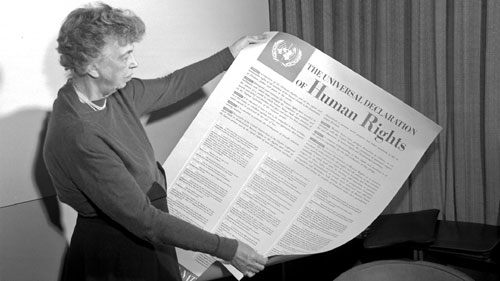|

After
the horror of widespread, devastation,
suffering and genocide that ravaged the
world during World War II, there was a
general consensus that something had to
be done to make sure this kind of gross
violation of human rights never took place
again. Protecting basic rights is essential
in creating a world at peace, and it was
one of the foundations of the goals of
the United Nations when it was created
in 1945. Building on the Four Freedoms
(freedom of speech, freedom of religion,
freedom from want, and freedom from fear),
which the Allies had agreed upon during
war, the UN Charter requires nations to
respect basic rights and freedoms and
to take action to protect them.
A
century and a half before, the US Bill
of Rights had expounded upon the general
call for respect in the US Constitution's
description of the natural rights of 'life,
liberty and the pursuit of happiness',
and enumerated specific ones. It was decided
that the United Nations had to do the
same to make it clear to nations what
'fundamental freedoms' and 'human
rights' all people of the earth should
be guaranteed. An international committee,
chaired by US First Lady Eleanor Roosevelt,
drafted the Universal Declaration of Human
Rights (UDHR), and it was adopted by the
United Nations General Assembly on December
10, 1948. Although it is not legally binding
for nations, the Universal Declaration
of Human Rights was a profound milestone,
as it painted a much clearer picture of
the specific essential requirements for
a more peaceful, just and sustainable
world than had ever before been described.
The UDHR is the most translated document
in the world, and it continues to provide
the moral and diplomatic framework for
those working for human rights to bring
about the changes needed to create a better
world. It has influenced many international
laws and treaties as well as most of the
national constitutions that have been
adopted since 1948. Today, the United
Nations Human Rights Council addresses
human rights violations, and numerous
nonprofit civil society organizations
throughout the world work to promote and
protect the rights and freedoms of all
people.
As
the world has become more global and interconnected,
the human rights movement has been able
to spread throughout the world, winning
rights for people everywhere. Many victories
have been won, but there is still a long
way to go: Today there are still 27 million
people in slavery ... Torture is still
used by more than 80 governments ... More
than 1 billion people do not have access
to clean water ... and many other injustices.
Many people and organizations work throughout
the year to help protect human rights
- often placing their own lives in danger.
Human Rights Day, the anniversary of the
adoption of the Universal Declaration
of Human Rights on December 10, is an
important global occasion to remind us
about their efforts and the importance
of protecting human rights for all as
the foundation of a better world.
Universal
Declaration of Human Rights in 403 different
languages
|